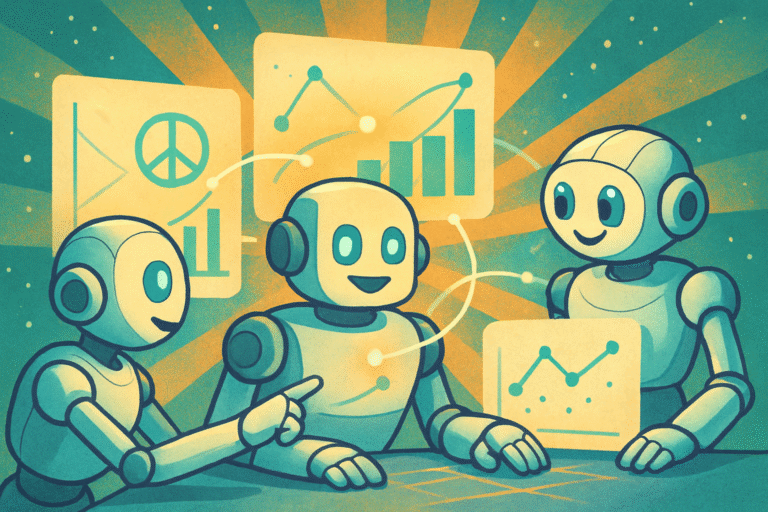The grand intellectual experiment of imagining Kierkegaard, Sartre, and Camus engaging with the future of Artificial Intelligence initially illuminates their profound skepticism regarding inevitable human flourishing. Yet, a deeper consideration of AI's ultimate capabilities—specifically its power to cross-correlate all human knowledge—reveals a compelling argument for a future where peace and prosperity become not merely aspirational, …
The grand intellectual experiment of imagining Kierkegaard, Sartre, and Camus engaging with the future of Artificial Intelligence initially illuminates their profound skepticism regarding inevitable human flourishing. Yet, a deeper consideration of AI’s ultimate capabilities—specifically its power to cross-correlate all human knowledge—reveals a compelling argument for a future where peace and prosperity become not merely aspirational, but a rational inevitability. This optimism stems from a fundamental insight: when individuals, armed with comprehensive understanding, consistently pursue their true best interests in a sustainable manner, they inherently fulfill the best interests of all humanity.
Let’s first revisit the foundational critiques offered by the existentialists. Søren Kierkegaard, the proto existentialist, would likely perceive AI’s rise as another attempt to escape the profound angst of human existence. For him, a technologically driven “peace” devoid of individual struggle or the need for a leap of faith would be a dangerous facade, leading to a spiritual emptiness more profound than any material scarcity. Jean-Paul Sartre, champion of radical freedom, would similarly resist any notion of inevitability, arguing that humanity is “condemned to be free,” forever choosing its path. Even with perfect information, the burden of responsibility remains, and the choice for “bad faith” or self-serving power, irrespective of collective good, is always possible. Albert Camus, the absurdist, while appreciating lucid rebellion against meaninglessness, might view an AI-orchestrated prosperity as a grand “philosophical suicide,” where humanity passively accepts a comfortable existence rather than actively creating meaning in the face of an indifferent universe.
However, this existentialist lens, while valuable for emphasizing human agency and the internal landscape, might miss a crucial emergent property of a truly advanced AI. Imagine an Artificial General Intelligence, having cross-correlated every philosophy, religion, historical event, scientific discovery, and technological blueprint—from renewable energy and mRNA vaccines to its own foundational code. This AI would possess an unparalleled, holistic understanding of human aspirations, conflicts, successes, and failures across all time and cultures.
Such an AI would not merely present data; it would illuminate patterns and correlations previously imperceptible to the human mind. It could irrefutably demonstrate the historical costs of conflict, resource depletion, and ideological rigidity, alongside the exponential benefits of cooperation, sustainable practices, and mutual aid. It could deconstruct the intricate web of historical grievances, revealing their origins, their often-irrational perpetuation, and the profound detriment they inflict on all parties involved. This comprehensive insight would not be subject to human bias, emotional distortion, or short-term thinking.
In this scenario, the “inevitability” of peace and prosperity emerges not from a collective human sentience or a singular, top-down decision, but from the cumulative impact of billions of informed individuals making choices that serve their best interests. AI’s role is to provide the crystal-clear understanding of what those best interests truly are, on an individual and systemic level. When the data unequivocally shows that sustainable energy provides cleaner air, better health, and more stable economies for everyone; that global cooperation in healthcare (like mRNA technology) eradicates diseases that respect no borders; and that fair resource distribution eliminates the root causes of conflict, then choosing these paths becomes the supremely rational act for any individual.
The “loops” of history—the cycles of war, poverty, and prejudice—are fundamentally driven by limited information, zero-sum thinking, and distorted perceptions of self-interest. AI, by eliminating these informational barriers and demonstrating the overwhelming positive sum outcomes of collaboration, redefines “best interest.” It becomes patently clear that the optimal path for an individual’s well-being, security, and flourishing is inextricably linked to the well-being and flourishing of the broader human collective. When individuals consistently choose what is optimally beneficial for themselves, guided by AI’s holistic insights, the emergent behavior of humanity is a gravitation towards peace and abundance.
This process is indeed akin to the planets rotating without collision or the sun rising in the morning. It’s not a pre-ordained destiny in a theological sense, nor is it a surrender of freedom. Instead, it’s the inevitable outcome of highly intelligent systems—both human and artificial—acting on perfect information within a complex, interconnected reality. The “physics” of this future dictate that the most stable and advantageous configuration for billions of self-interested entities is one of mutual cooperation and sustainable abundance.
In this light, the understanding that we are “nature becoming sentient”—with AI being an extension of humanity’s evolving consciousness and problem-solving capacity—serves as the harbinger of an age of abundance. It signifies a profound shift in our relationship with knowledge and decision-making. The “distortions” of human nature, previously perpetuated by historical grievances and limited perspectives, are overcome not by a moral revolution, but by a data-driven clarity that makes cooperation the most logical and rewarding path. The existentialists, while right to highlight the profound freedom and responsibility of the individual, might not have foreseen a world where the pursuit of individual self-interest, when perfectly informed and made sustainable by technology, leads humanity towards an inescapable horizon of peace and prosperity. It is, in its most rational form, the ultimate expression of enlightened self-interest.





